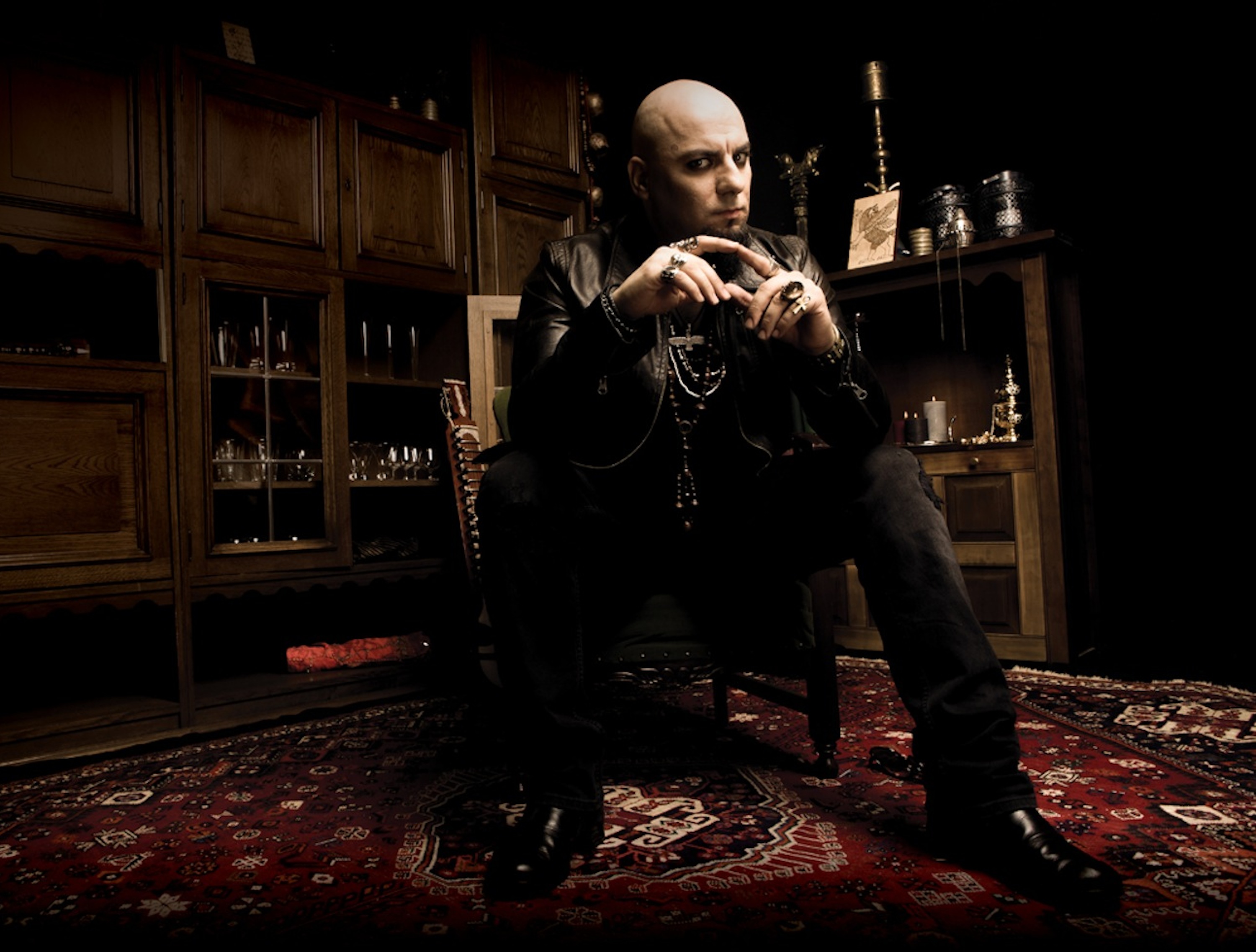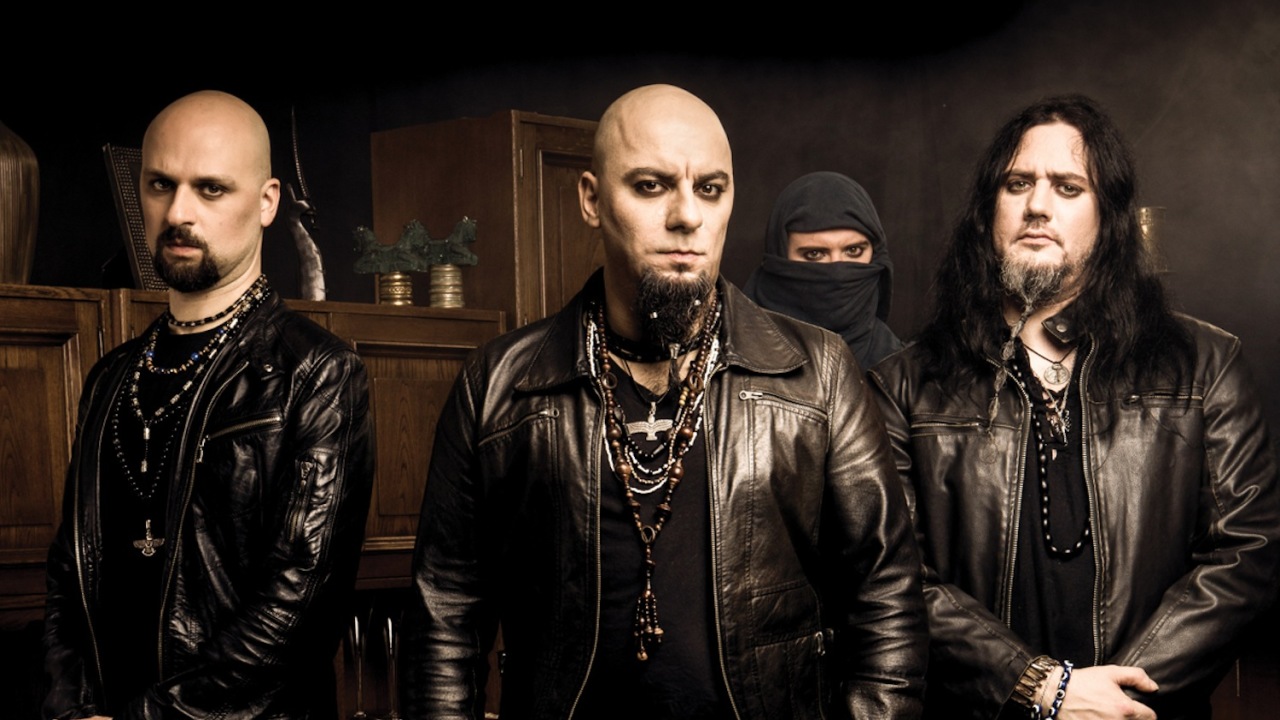I f the past few years in the underground have taught us anything, it’s that ambition doesn’t have to lead to compromise, and that it’s the bands who can tool up while remaining beacons for a core set of principles who stand the test of time. Electric Wizard’s enormously popular misanthropic doom and Behemoth – who defeated all comers last year with an uncompromising, ferocious black metal record that opens with the line ‘I saw the virgin’s cunt spawning forth the snake’ – may only be two examples, but the history of metal, from Black Sabbath through Pantera and Slipknot up to Nergal and co, follows the same pattern: stick to your guns if you want to meet your full potential.
Melechesh may not have done it deliberately, but they have done just that. The four-piece have – much like both Watain and Behemoth – a musical template that is now well-constructed, and includes accessible melody inherent in that. What even experienced observers did not expect was that the follow-up to 2010’s The Epigenesis, the record that could finally bring them the broad attention their massive riffs and infectious Middle Eastern-sounding black metal has long deserved, would be so much more aggressive.
“Because I’m angry,” says guitarist and vocalist Ashmedi, the band’s founder and the man who wrote all but two riffs of Enki, when asked about why the band have got so much more aggressive on this outing. “It was a very difficult year, and I was extremely angry, and I was on the verge of doing some very drastic things to myself. But then I started channelling that into the guitar, and it could have made the same song less aggressive, but it became more aggressive. Even if the song is atmospheric and not very fast, it’s still angry.”
A superficial glance at the band’s Wikipedia page would probably give you wrong impressions about Melechesh and Ashmedi, and the source of that anger. While it is certainly true that the early incarnation of the band – the one that released debut record As Jerusalem Burns… Al’Intisar in 1996 – had to leave their native Jerusalem and relocate to The Netherlands, it would be a wild error to get the impression of a politically charged individual bitter at the past./o:p
“I miss stuff there very much,” Ashmedi says in summation. “I go there once a year – I’m going in a few days. Jerusalem is very dynamic. There’s very good and very bad. In Holland, it was very medium! Sixteen years in Holland is like one week in Jerusalem.” In fact, the anger was purely down to personal conflicts, either with fellow musicians or the less decent operators of the music industry. Even the recent violence in Gaza does not appear to be the source of the ire – as his take on the political situation of the area suggests: “I don’t do politics. I just count the dead,” he says firmly. “It’s a very boring subject, and I don’t want to waste Melechesh time with that mundanity, because we are above that kind of stuff.” Do not let that give the impression that this is an uninterested, disengaged mind, however. Ashmedi can – and, speaking from bassist Scorpios’s house in Germany, does – talk at length about the problems he identifies with the metal scene, society, religion and a host of other topics. You have to keep in mind the complex background of the man; an Assyrian-Armenian, baptised at the alleged site of Christ’s Last Supper, a non-believer raised in the holiest city in the world, and a musician in a genre shunned by most even in liberal Western societies. While Hammer is asking about the mythology concerning the new record (see page 120), and specifically the glorious album closer The Outsiders, he rather clearly states why his perspective may be a little different to what you expect. “I was always an outsider in Jerusalem, in the Catholic school I was in there,” Ashmedi says. “I’ve been an outsider in the Israeli community, an outsider in the Arabic community – I’m neither. I’m an outsider in every community. I came to Holland and I was an outsider. In the music we make, we do it our way, so we are kind of the Outsiders.” Similarly, while he will talk at length on Mesopotamian mythology, Abrahamic religion and spirituality – and it is abundantly clear this is something he has thought long and hard about – it would be a mistake to assume Ashmedi is painting himself as some kind of Svengali for a belief set that has a similar relationship to Middle Eastern pagan faith as Odinism has to Norse paganism. When asked about how he went about discovering his own spiritual beliefs after realising, at a young age, that he did not believe the Christian faith he was being raised in, he says: “There’s the period of destruction and shedding everything – that’s when you become that rebellious, Satanist kind of guy – and then you start rationalising. You destroy that old building, you put in new foundations, and you start building it the way you want, with strong foundations and a pretty cool design. That’s pretty much it; I cherry-pick whatever’s good, and I use it. I’m not like a guy who’s some – although I look like it – guru or monk or hermit.
What Ashmedi truly seems to be about – and the aspect of him and Melechesh that is easiest to understand – is music. The band are scattered all over the world. Moloch, the band’s guitarist of 20 years, lives in Norway and is replaced live by a session player, as is drummer Lord Curse, who lives in San Jose, California. Of the band’s permanent members, only Scorpios and Ashmedi are likely to be seen on tour.
But this does not stop Ashmedi from being deadly serious about the band’s ambitions; this is what he does, what he wants to do, and he wants to see the band reach the highest level it can – and musically, they are both good enough and accessible enough to get big. But that is not all that counts.
“This is my full-time job, man, it’s been my job since 2006,” Ashmedi says. “I have a very lucrative, good university degree, and I don’t use it. I have an MBA – a master’s degree in business – I paid for it by touring, and I don’t use it. All I do is this band. Because it’s more like a path, a journey, a mission.
“Once we did an experiment in a big store in Amsterdam, and we out-sold Morbid Angel in the weeks that people just came to listen to it. It’s about music. But is music about music? I don’t know. Maybe if I make outlandish claims like ‘I ate a baby’ or say ‘If you fuck with me, I’m gonna cut your head off and tear your heart out’, maybe we’ll sell more albums, but I’m not willing to downgrade myself to that.”
Melechesch: uncompromising to the last.
ENKI IS OUT ON MARCH 2 VIA NUCLEAR BLAST/o:p

TALES OF THE SANDS
Three pieces of Enki’s mythology explained by Ashmedi
Enki
“Enki is the god of the gods in Sumerian/Mesopotamian mythology, and he created mankind. He always tried to protect mankind, from the floods, from the anger of the other gods like Enlil. That is one look at it. They say he was dwelling in the primordial water, the abyss – Absu – and he created mankind.”
Enlil
“Enlil is basically the counterpart of Enki. The cool thing about it is the concept of duality; it’s not necessarily good and evil, it’s a balance. Enlil is more trigger-happy. He’s a very angry deity against humans. Perhaps he’s so angry he’d want to come and set people straight right now, in the world. In a way, that’s a metaphor, because the world is chaotic, and people are fucking each other up.”
The Outsiders
“The Outsiders are entities who came to spur the advance of civilisation. People often confuse gods, angels, great minds and mysterious advances of civilisation and people with coincidence and religion; it could just be that an outside source, the Outsiders, played a hand in that. They made us. That’s including Enki, the Nephilim, Metatron, maybe the Devil or God – anything unearthly.”/o:p
